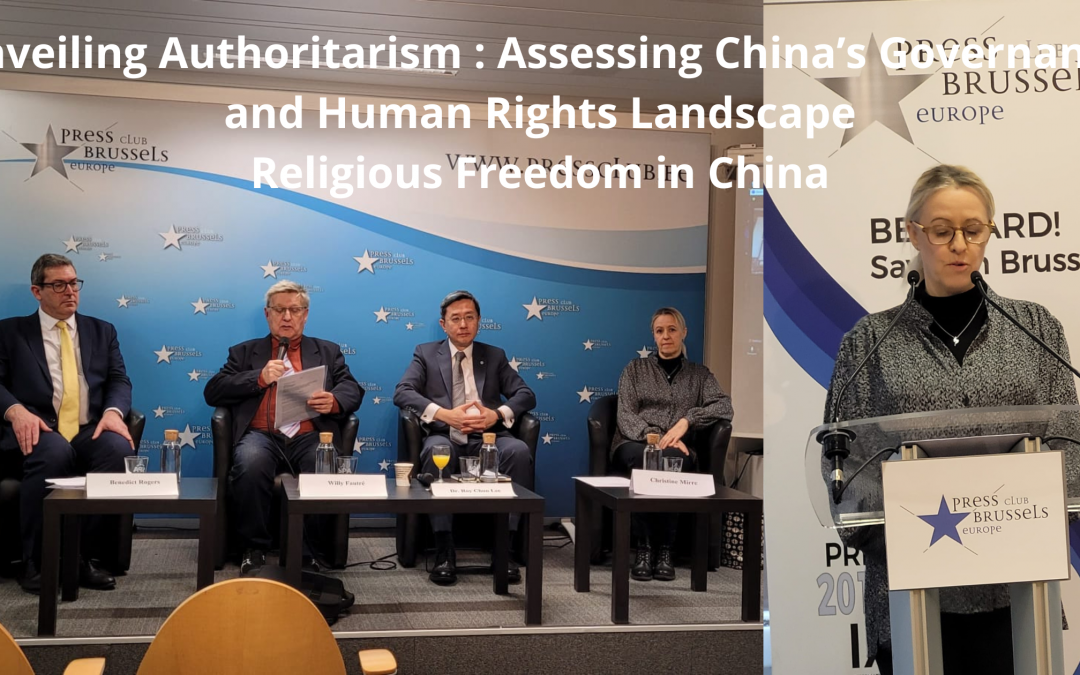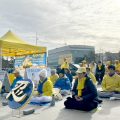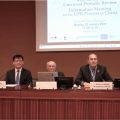I am Christine Mirre, Director of CAP Liberté de Conscience that is a secular NGO created in two thousand and dedicated to protecting the Right of Freedom of Religion and Belief. We combat all forms of discrimination based on religion or belief by alerting European and International bodies. We collect testimonies of discrimination and human rights violations affecting religious or belief communities to disseminate them to international bodies, and to raise awareness and inform them as well as to generate debate on the protection of Freedom of Religion and Belief. We also advocate for any religious or spiritual group facing discrimination to have their right to Freedom of Religion and Belief recognized.
Advocating for religious freedom in China is a complex and sometimes risky endeavor, perhaps more so than in any other country.
As Sir Geoffrey Nice and Mr. Introvigne explained the Chinese government tightly controls religious expression, particularly targeting minority religious groups and unregistered churches. Tibetan Buddhists, Uighur Muslims, Christians,Falun Gong practitioners ,Church of Almihgty God and much more face heavy persecution.
The implementation of policies such as ” sinicization ” of religion and the promotion of state-approved interpretations of faith have further eroded religious liberty.
While China has ratify the UDHR and ICCPR and the Chinese Constitution theoretically guarantees freedom of religion the reality on the ground tells a different story.
Before I give you some examples of our advocacy on religious freedom in China, I’d like to remind you of the main UN human rights mechanisms:
- The Human Rights Council (HRC): This is the UN’s principal intergovernmental human rights body. It consists of 47 member states and meets at least three times a year in Geneva, Switzerland.
Its role includes addressing human rights violations, including gross and systematic violations, promoting respect for human rights for all, and ensuring effective coordination and mainstreaming of human rights within the UN system.
- The Universal Periodic Review (UPR) is a unique mechanism of the Human Rights Council that requires each UN Member State to undergo a peer review of its human rights record every four and a half years. The UPR provides an opportunity for each state to regularly :
– report on the measures it has taken to improve the human rights situation in its country and to overcome obstacles to the enjoyment of human rights; and
– receive recommendations for continuous improvement from UN Member States, based on input from stakeholders and pre-session reports.
- The Office of the High Commissioner for Human Rights (OHCHR) is the principal human rights body of the United Nations. It represents the commitment of the international community to the promotion and protection of all human rights and freedoms as set out in the Universal Declaration of Human Rights.
The OHCHR includes special rapporteurs, including one dedicated to FORB, and various committees on human rights, torture, children, etc., as well as special procedures.
- NGOs with ECOSOC status (such as my NGO, CAP LC) are able to participate in the deliberations of member states in these various UN bodies and, most importantly, to raise issues and violations of human rights.
NGOs can make their voices heard in a number of ways:
- – Making written and oral statements at HRCs
- – Written submissions to UPRs
- – reporting to SRs, and
- – Side events on the margins of sessions
- – Meeting with member state representatives
This year, China is undergoing its 4th Universal Periodic Review.
CAPLC has participated in the last 3.
In 2013, CAP LC co-signed a submission denouncing crimes against Falun Gong members and forced organ harvesting.
This first submission on China had an impact on CAP LC’s ECOSOC status, as I will discuss later in the section on China’s subversion of UN bodies.
Then, in 2018, CAP LC led the submission of a coalition of a dozen international NGOs, including CESNUR, to denounce the persecution of the Church of the Almighty God (CAG) and other religious minorities, and to denounce forced labor camps for Uyghurs.
Our denunciations covered the following issues:
– Freedom of religion or belief
– Torture and cruel, inhuman, and degrading treatment
– Extrajudicial executions
– Arbitrary arrest and detention
– Freedom of expression, assembly and association
– Freedom from discrimination, right to work, right to education
A side event on the margins of this UPR was organized with HRWF and CESNUR to denounce these same violations by China.
In February 2024, we organized a conference on the sidelines of the 4th UPR cycle on China.
This conference brought together a dozen international experts on the issue of forced organ harvesting from Falun Gong members.
I would like to thank Mr. Benedict ROGERS, who was one of these experts.
We also denounced China at several Human Rights Council sessions:At every session of the Human Rights Council since 2016, CAP LC has intervened through written and oral statements on the issue of religious freedom in China. We have denounced the persecution, arbitrary detention, and torture of members of religious minorities, the forced organ harvesting of Falun Gong members, and the treatment of Uyghurs in forced labor camps in Xijiang.
We also organized several side events on the sidelines of the Human Rights Councils, where we gave the floor to experts, academics, and numerous Uyghur victims, Falun Gong members, and members of the Church of Almighty God.
In February 2022, we organized two side events on forced organ harvesting, where experts and politicians from around the world came to testify about this crime against humanity. At the end of these conferences, a coalition of NGOs launched the Universal Declaration on Preventing and Combating Forced Organ Harvesting, which has now been signed by hundreds of personalities.
As a result of these numerous advocacy activities and alerts carried out in coordination with other NGOs, several Member States and the Office of the High Commissioner for Human Rights decided to take up the issue of religious freedom violations in China.
China’s growing influence within the UN poses a significant risk of reshaping the organization to suit its own interests, potentially undermining its core functions.
Currently, Chinese nationals head four of the UN’s 15 specialized agencies and contribute 12% of the UN’s regular budget, making China the second-largest financial contributor after the United States.
China’s expanded leadership role has raised concerns about its agenda, particularly its integration of the Belt and Road Initiative into UN Sustainable Development Goals (SDGs), stifling criticism of its human rights record, and leveraging financial incentives to garner support from member states.
Under China’s influence, key UN positions, such as the under-secretary-general for the Department of Economic and Social Affairs,(ECOSOC) have been held by Chinese diplomats since 2007.
As I mentioned at the beginning, our application for ECOSOC status was blocked for more than four years by China, which put us on its “blacklist” of NGOs because of the submission we signed on the persecution of Falun Gong.
It was only thanks to the absence of the Chinese representative at the last review of our NGO that we were granted the status.
Even today, we are under constant pressure from China when we submit our quadrennial reports: China postpones the validation of our reports until the following sessions, asking ridiculous and insignificant questions such as “What have you done for religious freedom at the UN?”
Moreover, China’s exertion of pressure within the UN has led to restrictions on human rights groups’ participation:
I was myself violently interrupted during an oral statement to the Human Rights Council on the persecution of Church of Almighty God members by the Chinese representative, who shouted in Chinese to the stunned assembly that I should, and I quote: stop my circus and that I was in the pay of a devil cult.
During the last HRC session on Thursday, March 23, I witnessed China attempted to prevent prominent Uyghur activist Dolkun Isa, President of the World Uyghur Congress, from addressing the Human Rights Council as he called on the body to urgently investigate serious human rights allegations against China.
He was immediately interrupted by the Chinese deleguate, Mao Yizong, who questioned his legitimacy as a speaker and referred to him in Chinese as an “anti-Chinese, separatist and violent element.
The President of the Council rejected the Chinese representative’s request, and Dolkun Isa was able to finish his speech, in which he regretted that the issue of Xinjiang and the Uyghurs was not on the agenda, given the damning conclusions of the report by Ms. Bachelet, former High Commissioner for Human Rights, which highlighted “credible” allegations of widespread torture, arbitrary detention, and violations of religious and reproductive rights.
We have also observed in recent years that China uses an unfair trick to mobilize the speaking time allocated to NGOs during Human Rights Council sessions: GONGOs (Governmental Non-Governmental Organizations) register in large numbers to glorify the Chinese model, thus preventing any critical statements by human rights defenders.
In my view, the UN remains an important space for human rights advocacy because, as we have seen, it has special mechanisms for reporting human rights crimes and violations.
I think it’s important to do whatever we can to protect that institution from being “sinicized” and to continue to expose China’s crimes there, despite the pressure.
It is the responsibility of all human rights defenders, civil society and member states to protect this ideal conceived in 1948 with the Universal Declaration of Human Rights, and to keep the space of expression provided by the UN open to all victims deprived of their rights.
——————-
Source CAP LC 2013 – 2024
Soumission EPU 2013 : https://freedomofconscience.eu/2013-united-nations-human-rights-council-universal-periodic-review-china/
Déclaration écrite EPU https://freedomofconscience.eu/nine-international-ngos-jointly-condemn-the-ccps-persecution-of-the-church-of-almighty-god/
Side-event EPU 2018 https://freedomofconscience.eu/2018-united-nations-human-rights-council-universal-periodic-review-china/
Side-event EPU 2024 https://freedomofconscience.eu/non-governmental-organizations-held-a-briefing-at-the-united-nations-to-condemn-the-ccps-organ-harvesting/
Side-event EPU 2024 https://freedomofconscience.eu/45th-session-universal-periodic-review-working-group-information-meeting-on-china/
Side-event EPU 2024 https://dafoh.org/dafoh-statement-on-the-2024-universal-periodic-review-on-china/
Déclaration orale HRC 37 : https://freedomofconscience.eu/37th-session-hrc-religious-freedom-in-china-the-case-of-the-church-of-almighty-god/
Déclaration écrite HRC 38 : https://freedomofconscience.eu/arbitrary-detention-china/
Déclaration Orale HRC 38 : https://freedomofconscience.eu/38th-hrc-session-cap-lc-oral-statement-on-religious-freedom-in-china/
Déclaration écrite HRC 39 : https://freedomofconscience.eu/39th-hrc-session-written-statement-religious-persecution-of-a-new-religious-movement-in-china/
Déclaration Orale HRC 39 https://freedomofconscience.eu/universal-periodic-review-of-china-ngos-strike-back/
Déclaration écrite HRC 40 : https://freedomofconscience.eu/persecution-of-uighur-people-in-xinjiang-uighur-autonomous-region-uar-china/
Déclaration écrite HRC 40 : https://freedomofconscience.eu/limitations-of-religious-freedom-in-china-are-now-worse-than-they-even-were-since-the-cultural-revolution/
Side event EMISCO Xixang HRC 40 : https://freedomofconscience.eu/human-rights-situation-of-uyghur-minority-in-xinxiang-region-in-china-must-be-criticised/
Déclaration écrite HRC 42 : https://freedomofconscience.eu/written-statement-submitted-by-coordination-des-associations-et-des-particuliers-pour-la-liberte-de-conscience-a-non-governmental-organization-in-special-consultative-status-religion-based-refugee/
Déclaration écrite HRC 42 : https://freedomofconscience.eu/100-ngos-at-un-blast-chinas-anti-muslim-racism-protest-silencing-of-ngos/
Side-event New York United Nations : https://freedomofconscience.eu/united-nations-general-assembly-dafoh-discusses-role-of-forced-organ-harvesting-as-a-tool-of-religious-persecution-and-genocide-in-china/
Side event HRC 43 : https://freedomofconscience.eu/a-coalition-of-ngos-questions-the-peoples-republic-of-china-at-the-united-nations/
Side event HRC 49 : https://freedomofconscience.eu/escalation-of-human-rights-violations-in-the-21st-century-finding-solutions-to-help-combat-crimes-against-humanity/
Side event HRC 49 : https://freedomofconscience.eu/escalation-of-human-rights-violations-in-the-21st-century-state-sponsored-forced-organ-harvesting-of-living-people/
Déclaration écrite HRC 54 : https://freedomofconscience.eu/hrc-54-written-statement-forced-organ-harvesting-of-living-falun-gong-practitioners-in-china-has-to-end/
More information abou the conference :
02 03 2024 The People’s Network Brussels Conference Highlights Tensions in Hong Kong and China’s Global Human Rights Issues
https://bnnbreaking.com/politics/brussels-conference-highlights-tensions-in-hong-kong-and-chinas-global-human-rights-issues
02 03 2024 Eu Today : Brussels Conference Hears That China is Increasingly “Perceived as a Threat to the Global Stability of the World in the Near Future.”
https://eutoday.net/brussels-conference-china/






